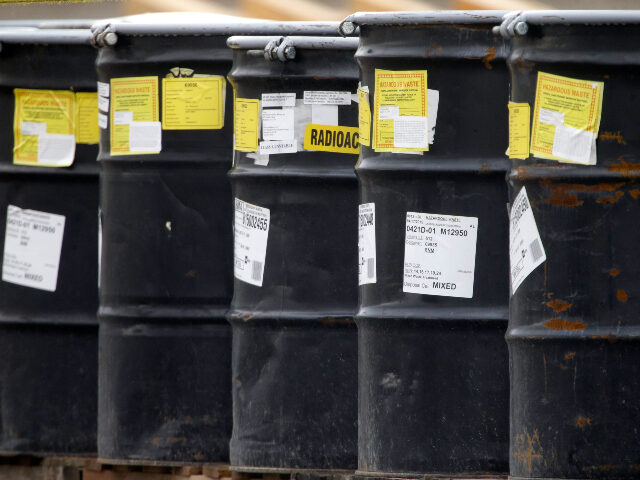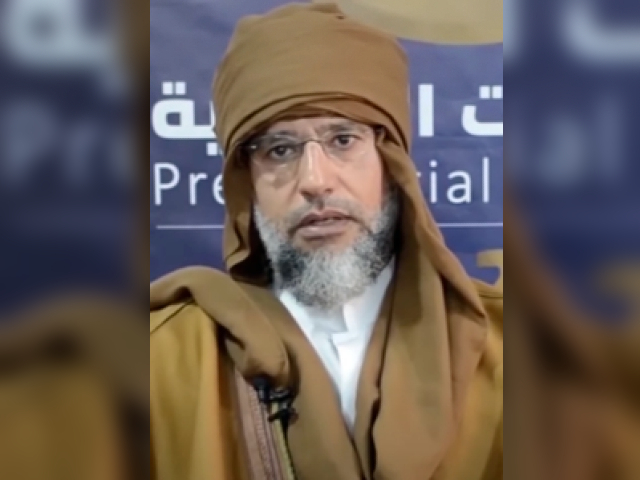The International Atomic Energy Agency (IAEA), the United Nations nuclear watchdog group, confirmed on Wednesday that its inspectors had discovered the disappearance of ten drums of “natural uranium,” totaling about 2.5 tons, from lawless Libya.
Under late dictator Muammar Qaddafi, Libya briefly pursued nuclear weapons development. Qaddafi, a prominent supporter of Marxist movements around the world, agreed to abandon his nuclear weapons and other weapons of mass destruction development and allow IAEA inspectors into the country. Once upheld as a template for other nations seeking nuclear weapons to agree to end development, rogue states such as Iran and North Korea now regularly point to Qaddafi’s bloody end as a warning to never abandon their nuclear weapons pursuit. Qaddafi was killed by a mob in a 2011 uprising supported by the administration of far-left American President Barack Obama.
The overthrow of Qaddafi, part of a phenomenon of widespread regional unrest known as the “Arab Spring,” left Libya mostly lawless. Over a decade later, the northern African country is home to two dueling governments, based in Tripoli and Tobruk, who have little control over most of the actual territory of Libya. In addition to those two forces, a host of roving militias and tribal groups control significant portions of the country. Political figures such as warlord Khalifa Haftar and bombastic Qaddafi son Saif al-Islam are arguably more prominent in the country than its self-proclaimed leaders.
The government in Tobruk, the “Government of National Accord,” is the entity recognized by the United Nations as the government of Libya.
The IAEA has attempted to maintain monitoring of leftover nuclear materials in the country following the end of the Qaddafi regime. IAEA inspectors, Reuters revealed in a report on Wednesday, arrived at a key nuclear storage site on Tuesday after being unable to schedule a visit last year.
The inspectors found “that 10 drums containing approximately 2.5 tons of natural uranium in the form of UOC (uranium ore concentrate) previously declared by (Libya) … as being stored at that location were not present at the location,” an IAEA report obtained by Reuters read.
“Natural uranium” is a term used to refer to uranium as commonly found in the earth without human enrichment, the vast majority of which is of the stable uranium-238 isotope. Uranium used as a nuclear energy source or for nuclear weapons typically needs to be enriched, meaning a significant percentage of the material consists of the unstable isotope uranium-235, which releases energy in its quest to return to stable 238 status.
Despite the nature of the material, the IAEA report concluded, “the loss of knowledge about the present location of nuclear material may present a radiological risk, as well as nuclear security concerns.”
The IAEA independently confirmed the veracity of the report to the left-wing outlet CNN.
“Agency safeguards inspectors found that 10 drums containing approximately 2.5 tons of natural uranium in the form of uranium ore concentrate were not present as previously declared at a location in the State of Libya,” CNN quoted the IAEA as saying in a statement, asserting that the agency is working with Libyan officials, without clarifying who that would mean, to find the missing uranium.
Neither report stated where in the country the uranium ore was supposed to be located. Reuters described its location outside of the scope of the territory controlled by the U.N.-backed Libyan government in Tobruk.
In 2011, shortly after the collapse of the Qaddafi regime, militias fighting to control the remaining power vacuum reportedly found “yellowcake,” meaning partially refined uranium, in the nation’s south, stored from the era prior to 2003.
“The Vienna-based International Atomic Energy Agency confirmed that yellowcake is stored in drums at a site near Sabha, which had been disclosed to the nuclear watchdog,” CBS News confirmed at the time. “The IAEA has tentatively scheduled safeguard activities at this location once the situation in the country stabilizes, according to spokeswoman Gill Tudor.”
The IAEA encouraged Libya at the end of 2011 to sell its uranium stockpiles because the country’s government was too unstable to protect it and the facilities storing it were deteriorating.
“The present safety and security measures at the facility are not deemed sufficient longer-term,” U.N. special envoy to Libya Ian Martin told the U.N. Security Council in December 2011. “There appears, however, to be no risk of proliferation given the weight and state of the barrels.”
The Sabha stockpile, as it is partially enriched, does not match the profile of the uranium ore reported missing this week.
The Government of National Accord was not intended to exist beyond 2022, as the United Nations had attempted to aid the organization of presidential elections for 2021. Calls for candidates resulted in 98 people formally registering to run for president by the end of 2021; authorities disqualified 25 of them. Among those disqualified was Saif al-Islam Qaddafi, who had spent years imprisoned by a local militia following his father’s death and resurfaced in 2021 barely recognizable. Once the “approachable” face of the Qaddafi regime, in Western casual clothing and with a reputation as a “playboy,” the new Saif al-Islam appeared in public in flowing Bedouin robes and promoting Islamist fundamentalism.
In November 2021, when the younger Qaddafi attempted to approach the election commission to register as a presidential candidate, armed gunman surrounded the commission headquarters and blocked him from entering. Qaddafi was initially disqualified from running for president, anyway, for a conviction on charges of human rights atrocities, but later reinstated as a candidate.
Less than a week before the election, Libya’s High National Electoral Commission (HNEC) abruptly canceled it. No elections have been held since.


COMMENTS
Please let us know if you're having issues with commenting.